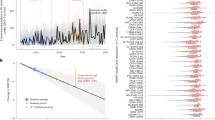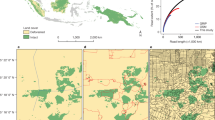Abstract
Understanding the challenge that climate change poses and crafting appropriate adaptation and mitigation mechanisms requires input from the breadth of the natural and social sciences. Anthropology's in-depth fieldwork methodology, long engagement in questions of society–environment interactions and broad, holistic view of society yields valuable insights into the science, impacts and policy of climate change. Yet the discipline's voice in climate change debates has remained a relatively marginal one until now. Here, we identify three key ways that anthropological research can enrich and deepen contemporary understandings of climate change.
This is a preview of subscription content, access via your institution
Access options
Subscribe to this journal
Receive 12 print issues and online access
$209.00 per year
only $17.42 per issue
Buy this article
- Purchase on Springer Link
- Instant access to full article PDF
Prices may be subject to local taxes which are calculated during checkout
Similar content being viewed by others
References
Gupta, A. & Ferguson, J. in Anthopological Locations: Boundaries and Grounds of a Field Science (eds Gupta, A. & Ferguson, J.) Ch. 1 (Univ. of California Press, 1997).
Crate, S. & Nuttall, M. (eds) Anthropology and Climate Change: From Encounters to Action (Left Coast, 2009).
Lipset, D. The tides: Masculinity and climate change in coastal Papua New Guinea. J. R. Anthropol. Inst. 17, 20–43 (2011).
Orlove, B. C., Chiang, J. C. H. & Cane, M. A. Forecasting Andean rainfall and crop yield from the influence of El Niño on Pleiades visibility. Nature 403, 68–71 (2000).
Lahsen, M. Anthropology and the trouble of risk society. Anthropol. News 48, 9–10 (2007).
Latour, B. & Woolgar, S. Laboratory Life (Princeton Univ. Press, 1986).
Knorr Cetina, K. Epistemic Cultures: How the Sciences Make Knowledge (Harvard Univ. Press, 1999).
Pickering, A. The Mangle of Practice: Time, Agency, and Science (Univ. of Chicago Press, 1995).
Callon, M., Law, J. & Rip, A. (eds) Mapping the Dynamics of Science and Technology: Sociology of Science in the Real World (Macmillan, 1986).
Collins, H. & Pinch, T. Frames of Meaning: The Social Construction of Extraordinary Science (Routledge, 1982).
Jasanoff, S. (ed.) States of Knowledge: The Co-Production of Science and the Social Order (Routledge, 2004).
Moore, F. C. Negotiating adaptation: Norm selection and hybridization in international climate negotiations. Glob. Environ. Politics 12, 30–48 (November 2012).
Lahsen, M. Seductive simulations: Uncertainty distribution around climate models. Soc. Stud. Science 35, 895–922 (2005).
O'Reilly, J., Oreskes, N. & Oppenheimer, M. The rapid disintegration of projections: The West Antarctic Ice Sheet and the Intergovernmental Panel on Climate Change. Soc. Stud. Sci. 42, 709–731 (2012).
Günel, G. A dark art: Field notes on carbon capture and storage policy negotiations at COP17. Ephemera 12, 33–41 (2012).
Diemberger, H. et al. Communicating climate knowledge: Proxies, processes, politics. Curr. Anthropol. 53, 226–244 (2012).
Rudiak-Gould, P. Promiscuous corroboration and climate change translation: A case study of the Marshall Islands. Glob. Environ. Change 22, 46–54 (2012).
Dove, M. R. North-south relations, global warming, and the global system. Chemosphere 29, 1063–1077 (1994).
Lahsen, M. A science-policy interface in the Global South: The politics of carbon sinks and science in Brazil. Climatic Change 97, 339–372 (2009).
Lahsen, M. in Paranoia Within Reason: A Casebook on Conspiracy as Explanation (ed. Marcus, G.) 111–136 (Univ. of Chicago Press, 1999).
Lahsen, M. Anatomy of dissent: A cultural analysis of climate skepticism. Am. Behav. Sci. http://dx.doi.org/10.1177/0002764212469799 (2013).
Bar-Yosef, O. Climatic fluctuations and early farming in West and East Asia. Curr. Anthropol. 52, S175–S193 (2011).
Dillehay, T. & Kolata, A. long-term human response to uncertain environmental conditions in the Andes. Proc. Natl Acad. Sci. USA 101, 4325–4330 (2004).
Axtell, R. et al. Population growth and collapse in a multiagent model of the Kayenta Anasazi in Long House Valley. Proc. Natl Acad. Sci. USA 99, 7275–7279 (2002).
Weiss, H. et al. The genesis and collapse of third millennium North Mesopotamian civilization. Science 261, 995–1004 (1993).
Kaniewski, D., van Campo, E. & Weiss, H. Drought is a recurrent challenge in the Middle East. Proc. Natl Acad. Sci. USA 109, 3862–3867 (2012).
Kennett D. J. et al. Development and disintegration of Maya political systems in response to climate change. Science 338, 788–791 (2012).
Medina-Elizalde, M. & Rohling, E. J. Collapse of classic Maya Civilization related to modest reduction in precipitation. Science 335, 956–959 (2012).
Parker, G. Global Crisis: War, Climate Change, and Catastrophe in the Seventeenth Century (Yale Univ. Press, 2013).
Weiss, H. & Bradley, R. What drives societal collapse? Science 291, 609–610 (2001).
McIntosh, R., Tainter, J. & McIntosh, S. (eds) The Way the Wind Blows: Climate, History and Human Action (Columbia Univ. Press, 2000).
Strauss, S. & Orlove, B. Weather, Climate, Culture (Berg, 2003).
Mathews, A. Unlikely alliances: Encounters between state science, nature spirits, and indigenous industrial forestry in Mexico, 1926–2008. Curr. Anthropol. 50, 75–101 (2009).
McIntosh, R. in The Way the Wind Blows: Climate, History and Human Action (eds McIntosh, R., Tainter, J. & McIntosh, S) Ch. 5 (Columbia Univ. Press, 2000).
Orlove, B., Wiegandt, E. & Luckman, B. Darkening Peaks: Glacier Retreat, Science, and Society (Univ. of California Press, 2008).
Orlove, B. Human adaptation to climate change: A review of three historical cases and some general perspectives. Environ. Sci. Policy 8, 589–600 (2005).
Cockcroft, J., Frank, A. & Johnson, D. Dependence and Underdevelopment (Anchor, 1972).
Moore, F. C. “Doing adaptation”: The construction of adaptive capacity and its function in the international climate negotiations. STAIR 5, 66–89 (2010).
Hecht, S. & Cockburn, A. Fate of the Forest: Developers, Destroyers, and Defenders of the Amazon (Univ. of Chicago Press, 2011).
McElwee, P. Resource use among rural agricultural households near protected areas in Vietnam: The social costs of conservation and implications for enforcement. Environ. Manage. 45, 113–131 (2010).
Tsing, A. L. Friction: An Ethnography of Global Connection (Princeton Univ. Press, 2005).
Ferguson, J. Global Shadows: Africa in the Neoliberal World Order (Duke Univ. Press, 2006).
Fleming, J. & Jankovic, V. Revisiting klima. Osiris 26, 1–15 (2011).
Hulme, M. Reducing the future to climate: A story of climate determinism and reductionism. Osiris 26, 245–266 (2011).
Cassidy, R. Lives with others: Climate change and human-animal relations. Ann. Rev. Anthropol. 41, 21–36 (2012).
Wolfe, E. Europe and the People Without History (Univ. of California Press, 1982).
Conway, D. From headwater tributaries to international river: Observing and adapting to climate variability and change in the Nile Basin. Glob. Environ. Change 15, 99–114 (2005).
Barnes, J. Cultivating the Nile: The Everyday Politics of Water in Egypt (Duke Univ. Press, in the press).
Hawkins, E. & Sutton, R. The potential to narrow uncertainty in regional climate predictions. Bull. Am. Meteorol. Soc. 90, 1095–1107 (2009).
Agrawal, A., Lemos, M., Orlove, B. & Ribot, J. Cool heads for a hot world — Social sciences under a changing sky. Glob. Environ. Change 22, 329–331 (2012).
Yearley, S. Sociology and climate change after Kyoto: What role of social science in understanding climate change? Curr. Sociol. 57, 389–405 (2009).
Hulme, M. Meet the humanities. Nature Clim. Change 1, 177–179 (2011).
Nisbet, M., Hixon, M., Moore, K. & Nelson, M. Four cultures: New synergies for engaging society on climate change. Front. Ecol. Environ. 8, 329–331 (2010).
O'Neil, S., Hulme, M., Turnpenny, J. & Screen, J. Disciplines, geography, and gender in the framing of climate change. Bull. Am. Meteorol. Soc. 91, 997–1002 (2010).
Acknowledgements
Funding for the workshop discussion that informed this Perspective and for the writing of the Perspective was provided by the Yale Climate and Energy Institute, the Edward J. and Dorothy Clarke Kempf Fund, the MacMillan Center for International and Area Studies and the Tropical Resources Institute at Yale.
Author information
Authors and Affiliations
Contributions
JB and MD wrote the first draft of this article. ML, AM, PM, RM, FM, JO, BO, RP, HW, and KY contributed extensive comments.
Corresponding author
Ethics declarations
Competing interests
The authors declare no competing financial interests.
Rights and permissions
About this article
Cite this article
Barnes, J., Dove, M., Lahsen, M. et al. Contribution of anthropology to the study of climate change. Nature Clim Change 3, 541–544 (2013). https://doi.org/10.1038/nclimate1775
Received:
Accepted:
Published:
Issue Date:
DOI: https://doi.org/10.1038/nclimate1775
This article is cited by
-
Indigenous Peoples and local communities report ongoing and widespread climate change impacts on local social-ecological systems
Communications Earth & Environment (2024)
-
Climate change perception in Romania
Theoretical and Applied Climatology (2022)
-
The Rise and Fall of Wiñaymarka: Rethinking Cultural and Environmental Interactions in the Southern Basin of Lake Titicaca
Human Ecology (2021)
-
Climate change research and the search for solutions: rethinking interdisciplinarity
Climatic Change (2021)
-
Including indigenous and local knowledge in climate research: an assessment of the opinion of Spanish climate change researchers
Climatic Change (2020)



